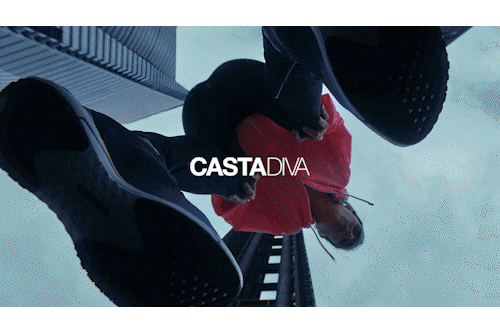
In Conversation with Director and Olympian Savanah Leaf

Given that this is a publication primarily about advertising and creativity, it’s not commonplace that we get to interview Olympians. But Savanah Leaf is exactly that, having competed for Team GB’s volleyball team at the London 2012 Olympics. The real reason we’re picking her brains though is for her filmmaking ability. She’s just launched ‘The Ayes Have It’, a poetic interpretation of Tiana Clark’s poem of the same name, which discusses the murders of Emmett Till and Trayvon Martin in the US. Savanah’s visual interpretation of the poem is inspired by news reports around both cases and manages to be rooted in realism despite its sometimes bold, abstract imagery.
LBB’s Addison Capper caught up with Savanah to find out more about The Ayes Have It, her experience with Team GB and life in front of the camera as a model.
LBB> Your new film The Ayes Have It is beautiful and tackles some big, important issues. Can you tell us a bit about it?
SL> The film is ultimately a poetic interpretation of Tiana Clark’s poem ‘The Ayes Have It’. The poem doesn’t shy away from the truth. So with the film, I wanted to create that same feeling with vivid imagery that directly speaks to important moments in history and the emotional impact on people in US society. The poem talks about the Emmett Till and Trayvon Martin murders, and how this impacts her being a young mixed-race woman in the South. It also plays with people’s perceptions and the media’s reporting of those cases, which I decided to use as inspiration for the imagery in the film.
LBB> As you mention, it’s a film based around a poem by Tiana Clark - how did the relationship come about with her? And how did you find shooting to a poem like this?
SL> Motionpoems charity approached me early last year and asked me if I would like to be a part of this year’s series called ‘Dear Mr. President’. Essentially the charity links poets with filmmakers to create films around social and political topics. So when I was given a handful of poems to choose from, I was drawn to Tiana Clark’s in particular because it has this raw energy around a topic that I have been eager to make a film about. The preparation for shooting a poem like this was intensive. We basically organised our thoughts extensively so that from start to finish the film moved with every line of the poem. It’s almost like a music video in that respect because it’s carefully calculated with the ebbs and flows of the poem.
LBB> The cinematography is really varied - mostly black and white, some colour, some what looks like 8mm, etc. Can you tell us how you achieved all of this and the inspiration behind your choices?
SL> I worked closely with Joel Honeywell who understood the vision straight from the treatment. I had a lot of references from early photographers in the US, as well as news clippings from articles based on the Emmett Till and Trayvon Martin cases. I also watched quite a lot of documentaries on murder trials where victims were denied justice. The details in these cases served as inspiration for the art direction across each shot, and the movement from scene to scene. Joel and I decided to shoot on 16mm with a mix of black and white and colour. This worked really well with the poetry as well as the viewers’ experience of the film. Ultimately, the goal was to create a film where the viewer becomes a participant in the film experience, which involved many different aspects in cinematography and sound.
LBB> One thing that strikes me is that it seems very rooted in realism but there are some more abstracts moments, such as the eyeball being cut and the child with three eyes. What was your reasoning behind that?
SL> I think the emotions provoked from abstract moments can feel more real than actual real-life moments documented. People will always act differently in front of camera, even if it’s a documentary, so those abstract moments can serve as the true emotion that people are feeling. Most of the more abstract sequences in The Ayes Have It actually came to me in various dreams. I remember waking up in the middle of the night with that image of a boy crying from his third eye. That really struck a chord with me and I have been meaning to make a film about it. This film felt perfect for that image because it creates an emotion that I think is hard to describe any other way.
LBB> Which other pieces of recent work are you particularly proud of and why?
SL> I have a mini-doc series coming out soon in conjunction with Gilles Peterson and Havana Club. I’m quite proud of this piece because it was an extremely intensive shoot and edit, and I think we managed to draw out a new and exciting take on up and coming musicians in Cuba.
LBB> Let’s talk about you… where did you grow up and what kind of kid were you?
SL> I was actually born in London, and lived in Vauxhall for about 10 years before I moved to the Bay Area in California. So I always felt in the middle of the ocean a bit, because while I live in the States now, I also have a strong connection to London and go there a lot. Growing up, well I guess I’ve always been quite a hard worker. I played sports nonstop because I wanted to get into university, and getting a scholarship was the only way I could see myself going. But at the same time, I was absolutely obsessed with painting and drawing, and I would spend all my lunches in the art department at school. I always liked to keep myself busy with many different activities.
LBB> You competed in the 2012 Olympics for Team GB’s volleyball team! That’s amazing. How did you find the experience? And for how long have you playing volleyball and what attracted you to the sport?
SL> That experience was one of the best moments of my life. I had been playing since a year after I moved to the States, and the sport came quite natural to me. I loved basketball, but I was always a bit scrawny for basketball and I wasn’t getting as many offers in my first year of high school. So then I decided to focus more of my time on volleyball because it was not only fun, but I was good at it. I’ve always been competitive and very much into style of play (which is one of the reasons I love watching basketball) and volleyball is one of those sports which is all about tricking your defenders and thinking ahead of the play. So I like that sort of a game, and that’s definitely the style that I play with.
LBB> You model as well as direct and photograph - how do you find being in front of the camera and how does that experience inform your work behind it?
SL> I started modelling before directing or taking photography more seriously. Honestly it helped me a lot in understanding what was helpful and not helpful in terms of communication from the director. I have sort of stopped modelling for now because I was always getting critiqued that I was slightly heavier than everyone else, and I had an edgy look, but not edgy enough. So it hasn’t really been something I’ve continued to pursue. But I do love doing both, and I think learning about both helps inform how to be better at the other.
LBB> Who and what are your creative inspirations?
SL> My creative inspirations come from everything. Sounds a little cliché but inspiration comes from anything that has an emotional impact on me: from my sister’s stories, to photography, to architecture, to snippets of conversations passing by in the street, to my personal history, to the news, to dance, to theatre, to just watching people in the streets. I don’t always get to be as creative as I’d like to be in my work, but I think more and more people are open to hearing new voices and they’re keen to hear from new sources of inspiration.
LBB> What do you like to get up to outside of work?
SL> I love to try new activities. Like I’ve recently been trying to DJ. Very early stages though.















